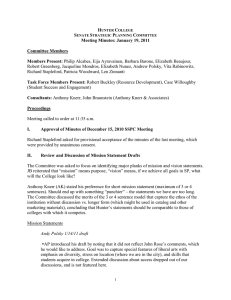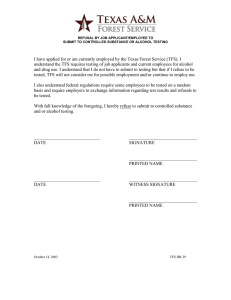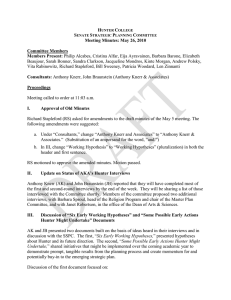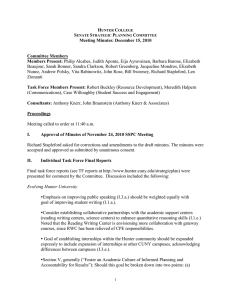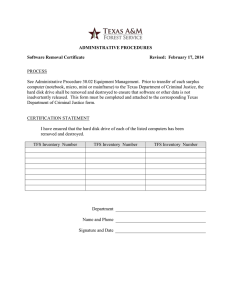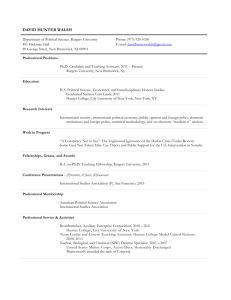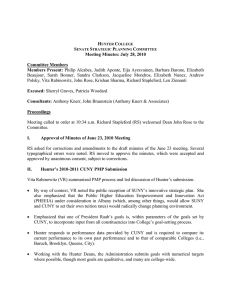H C S
advertisement
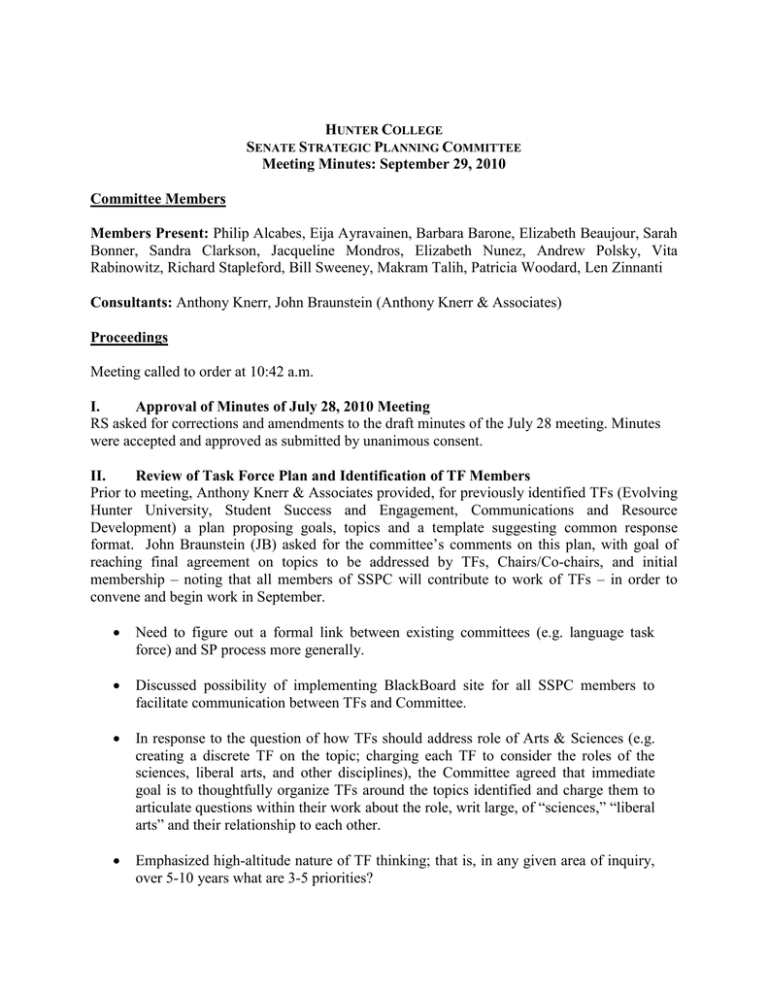
HUNTER COLLEGE SENATE STRATEGIC PLANNING COMMITTEE Meeting Minutes: September 29, 2010 Committee Members Members Present: Philip Alcabes, Eija Ayravainen, Barbara Barone, Elizabeth Beaujour, Sarah Bonner, Sandra Clarkson, Jacqueline Mondros, Elizabeth Nunez, Andrew Polsky, Vita Rabinowitz, Richard Stapleford, Bill Sweeney, Makram Talih, Patricia Woodard, Len Zinnanti Consultants: Anthony Knerr, John Braunstein (Anthony Knerr & Associates) Proceedings Meeting called to order at 10:42 a.m. I. Approval of Minutes of July 28, 2010 Meeting RS asked for corrections and amendments to the draft minutes of the July 28 meeting. Minutes were accepted and approved as submitted by unanimous consent. II. Review of Task Force Plan and Identification of TF Members Prior to meeting, Anthony Knerr & Associates provided, for previously identified TFs (Evolving Hunter University, Student Success and Engagement, Communications and Resource Development) a plan proposing goals, topics and a template suggesting common response format. John Braunstein (JB) asked for the committee’s comments on this plan, with goal of reaching final agreement on topics to be addressed by TFs, Chairs/Co-chairs, and initial membership – noting that all members of SSPC will contribute to work of TFs – in order to convene and begin work in September. Need to figure out a formal link between existing committees (e.g. language task force) and SP process more generally. Discussed possibility of implementing BlackBoard site for all SSPC members to facilitate communication between TFs and Committee. In response to the question of how TFs should address role of Arts & Sciences (e.g. creating a discrete TF on the topic; charging each TF to consider the roles of the sciences, liberal arts, and other disciplines), the Committee agreed that immediate goal is to thoughtfully organize TFs around the topics identified and charge them to articulate questions within their work about the role, writ large, of “sciences,” “liberal arts” and their relationship to each other. Emphasized high-altitude nature of TF thinking; that is, in any given area of inquiry, over 5-10 years what are 3-5 priorities? Evolving “Hunter University” Bill Sweeney noted dramatic changes in graduate education and research function in science departments. He suggested that a sub-task force (including members from Biology, Chemistry, Physics and a representative from the business office) addressed to clarifying the relationship between College depts. and Ph.D. programs might be needed. Vita Rabinowitz indicated that a parallel strategic planning process is ongoing for sciences, co-led by Jeff Lawrence and Joleen Small. A central question for that group is the relationship of doctoral programs to the College and the financial implications of that relationship. Address relationship of “Evolving Hunter University” work to charge and ongoing work of existing task force on the sciences, coordinate its efforts with that group and determine necessity of sub-TF on sciences. Address workload and faculty development. Student Success and Engagement Student career goals, student advising and student satisfaction should be priority issues. Communications Communication with students should be an issue for this TF. Technology should be addressed as a separate TF issue. It was noted that the TFs “Evolving Hunter University” and “Communications” might share some work in this regard. Given that 80th Street has taken the lead in planning for introducing new technology, this TF should be asked to identify the needs that technology, if properly implemented, could meet. Address institutional transparency or institutional publicity (relationship between these). Resource Development Need to include public relations as an issue. III. Discussion of Revised Preliminary Strategic Plan Framework Framework presented in June provided rough categories for Committee’s consideration. The current version incorporates feedback from June and some of the points from the Committee’s discussion with the President. Specific suggestions included: Need for space is so closely linked to feasibility of achieving certain priorities that it should be part of “Vision.” “Values: Diversity”: To tap into Hunter’s expansive, rich interest in diversity, Framework should address process for “accommodation”; or, is there a term that expresses more clearly what we are going to do? Suggested that “Values: Community” wording might be changed to “fostering intellectual and social exchanges.” Questioned focused on “cross-disciplinary teaching and research” without broader College-wide agreement on features of a research model. Re-organize “Recruit, develop and retain a diverse and exceptional faculty”: More emphasis on good teaching as a part of what we do. Framework should give prominent place to faculty development at all levels, retention of faculty, need for pedagogical center. In lieu of goals for the GER (previously addressed by Middle States), highlight writing reforms and working toward developing students’ oral communication skills. Student Success and Engagement TF should analyze “critical similarities and differences between College’s transfer and first-time-student populations.” John Braunstein and Anthony Knerr asked Committee to consider scope of Strategic Goals: Would achieving these goals lead to the improved Hunter you want to see? Discussion focused on the following: Hunter’s “surrounding community” should be NYC. “Vision” should emphasize excellence of undergraduate education. Need to address bringing instructional strategies up-to-date (e.g. implementing student response systems). How can SP address question of how Hunter fits into NYC’s overall educational picture? IV. Additional Items Richard Stapleford will provide a preliminary report on the committee’s work to the Senate at its October 13 meeting, and a fuller report in December. V. Adjournment The meeting was adjourned at 1:30 pm. Minutes submitted by Simone White, Administrative Assistant to the Committee
